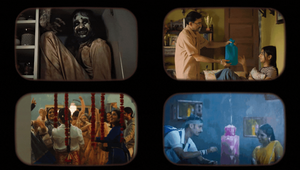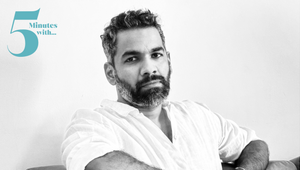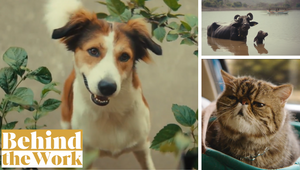
How Lowe Lintas Champions Child Safety with ‘Protect Little Riders’

TVS Motor Company launched the 'Protect Little Riders' campaign as part of its #TVSRide4Safety initiative to raise awareness about the importance of helmet use for children riding on two-wheelers.
The spot addresses common misconceptions and barriers to adoption, encouraging parents to prioritise child safety by offering specialised helmets and resources for selecting an appropriate size.
The campaign identifies key barriers to helmet adoption, such as misconceptions about safety and the unavailability of suitable helmets. It seeks to change parental attitudes through impactful messaging, partnerships with regulatory bodies, and a dedicated website to promote awareness and provide resources for selecting fitting helmets for children.
Speaking to LBB about promoting a cultural shift towards responsible riding practices, Subramanyeswar S. (Subbu), group CEO and CSO-APAC at MullenLowe Global, discusses the inspiration and rationale behind the 'Protect Little Riders' campaign, noting that the idea emerged from an insight about the neglect of helmet safety for children on two-wheelers.
LBB> What inspired TVS Motor Company to focus specifically on children’s helmet safety as part of the #TVSRide4Safety initiative?
Subbu> Inspiration is sometimes found in the most obvious things where few others bother to look. They come like a gift and aren’t planned. Sonali Khanna, one of our business leaders, had the incredible thought of protecting the little riders. A telling truth that we never saw until she expressed it so simply. We were instinctively thrilled by the idea and dug deep to find numerical and human data to see a business rationale before we went to TVS.
In parallel, we also reached out to some helmet makers to get a prototype done because of the value in learning it gives us to execute than the code per se.
LBB> Can you describe the process of identifying the key barriers to helmet adoption for children and how these insights shaped the campaign?
Subbu> For more than half of Indian households, a 2-wheeler is their primary vehicle. And 80% of children travelling on these 2-wheelers do not wear helmets. Sadly, India sees 1.56 million motorcycle fatalities annually, with over 14,000 pillion rider deaths. Shockingly, 7800 of those pillions are innocent children (Source: Govt of India Ministry of Transport Road Accident Report 2021).
Our new ‘Protect Little Riders’ initiative drove us this time to get under the skin of the audience to discover the barriers/tensions that prevented or haven’t made parents so far explore the usage of safety gear for their children while riding.
To our surprise, we found that:
1. Culturally in India, there exists a misconception that only the rider needs a helmet, and the pillion, whoever it is, doesn’t, as they are at the back.
2. Parents live under the illusion that as long as the vehicle is in reasonable control and they ride safely, no harm can befall their children as pillion. Some even ignorantly or unwittingly said that in-between the ride, they even turn their heads and look at the child to see if they are safe.
3. Many parents said that as they mostly travel short distances with children, the shorter proximity lowers the risk of accidents.
4. Most parents have never heard of or even seen helmets made for children on two-wheelers. The ones who had known about them and tried to find one didn’t get the right size or were simply unavailable.
LBB> How does the campaign address the main reasons for low helmet usage among children, which were identified through research?
Subbu> The issues of ‘vehicle being safe in parent’s control’ and ‘proximity of destination lowering accidents’ have been addressed directly by our messages through films ‘Unparents’ and ‘Spot the mistake.’
On the ‘implementation of traffic rules’ that mandate children aged four years and above to wear helmets, but the compliance is poor, TVS is working with regulatory authorities towards introducing the subject/training of children’s helmets in the learners’ licence test at RTOs. We are also working hard to impress the authorities to impose fines on two-wheeler riders travelling with kids without helmets.
‘The lack of storage space’ has been addressed first with TVS Jupiter, the family scooter with space for two helmets. The agenda of ‘Protect Little Riders’ is now being driven passionately into the TVS design culture and manufacturing process for its two-wheelers.
LBB> What were the main challenges in developing a specialised range of helmets for kids, and how were these overcome?
Subbu> As one of India’s leading 2-wheeler manufacturers, TVS wanted to champion the need or cause for road safety gear, especially for children, and develop a line of helmets in various sizes/fits for every age group.
Also, the key issue was children growing up and outgrowing the helmet size. TVS is in talks for introducing a novel scheme of ‘Helmet exchange’ at the dealerships so parents could quickly upgrade helmets for their growing children without paying the total price again.
LBB> Can you explain the role of the dedicated website in the campaign? How does it assist parents in selecting the right helmet for their children?
Subbu> The dedicated website serves as a wonderful medium to promote awareness, understanding, and action among the community of parents.
The website invites viewers to take a pledge for ‘child safety.’ The stories/films featured on the website are meant to evoke or, even better, provoke and inspire action in parents. We have had 36k+ people taking our pledge to date. It also lists simple tips for children to choose helmets and points to multiple online platforms where the same can be ordered instantly.
LBB> In what ways does the Protect Little Riders campaign aim to drive behavioural change among parents regarding helmet safety for their children?
Subbu> Children not wearing helmets on two-wheelers is a truly peculiar issue. And perhaps the biggest blind spot on Indian roads today. It’s a mistake happening on every street, every day – in broad daylight - yet no one sees it.
On one hand, every parent wants to do so much for their child – yet the overwhelming population forgets to give helmets to their children. Therefore, the creative strategy conceptualised and brought alive brilliantly by one of our top creative leaders, Sarvesh Raikar and his team was to bring to life this omnipresent, mind-boggling irony. The same parents who would risk their lives to protect their offspring are wearing helmets themselves without providing one to their little ones.
LBB> How does Protect Little Riders fit into the broader #Ride4Safety campaign, and what future steps are planned to continue promoting helmet safety?
Subbu> We are currently in talks with multiple brands to raise awareness on this issue and help us drive the adoption of helmets for children. We are also working with regulatory authorities to raise awareness at the starting point of a 2-wheeler rider’s journey, i.e. the RTO, and enforce the adoption of children’s helmets by levying relevant penalties on the road.
LBB> Can you share any metrics or early results that indicate the success or impact of the Protect Little Riders campaign so far?
Subbu> The campaign was extremely well received by the audience, both online and offline.
1. Within two weeks of the campaign launch, it garnered over three million views on YouTube. The films had a VTR of over 43% against the industry benchmark of 10-15%, indicating that many viewers watched the film until the end. With over 80 unpaid mentions, the film garnered earned PR for raising awareness of a vital road safety issue.
2. Collaborations with influencers recorded eight Lakh+ unique engagements.
3. The microsite developed as an extension of the campaign recorded over six lakh unique sessions, indicating consumer interest in knowing more about the campaign message.
4. Various field teams also reported an increase in enquiries for kids’ helmets across TVS dealerships nationally. Free helmets were distributed with every TVS two-wheeler purchase. The sales of TVS helmets for kids doubled three months after the campaign launch.
5. Over 36,842 people have taken the pledge on the brand website to protect little riders.
While deep-rooted cultural behaviours cannot be changed overnight, the message that is acknowledged and shared widely amongst parents and people, in general, is a huge win.















